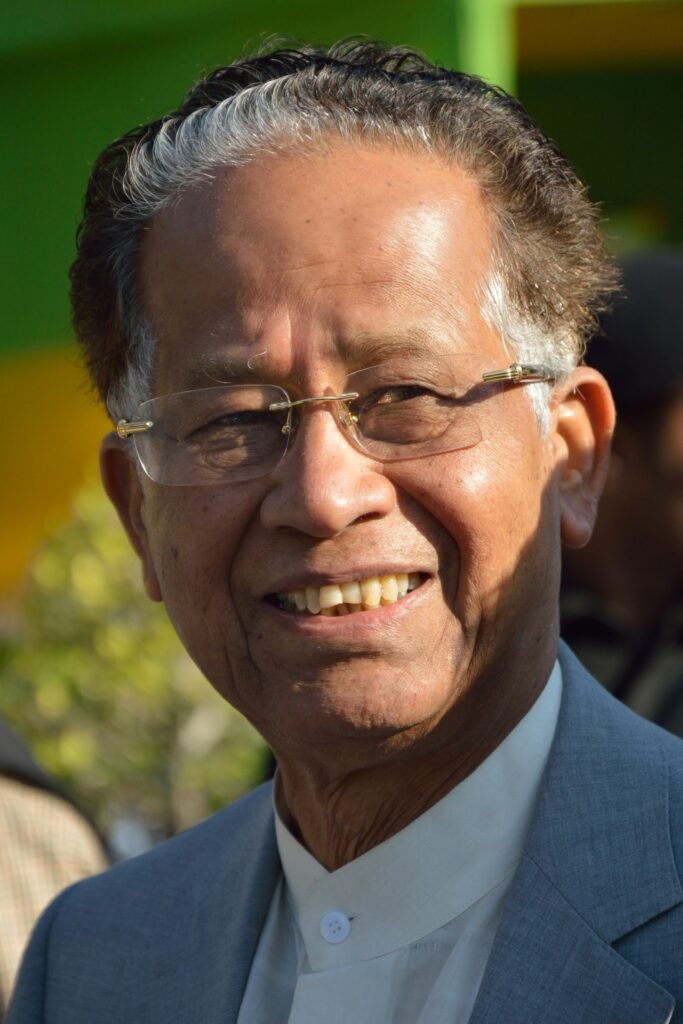Tarun Gogoi, one of the most influential political leaders in Assam’s history, is remembered for his unwavering dedication to public service, transformative leadership, and commitment to democratic values. His tenure as Chief Minister from 2001 to 2016 brought stability, economic revival, and peace to a state once riddled with unrest and financial crisis.
Early Life and Education: Foundations of a Leader
Born on October 11, 1934, at Rangajan Tea Estate in Jorhat, Assam, Tarun Gogoi hailed from an Assamese Tai-Ahom family. His father, Dr. Kamaleswar Gogoi, was a respected doctor, while his mother, Usha Gogoi, was the sister of acclaimed Assamese poet Ganesh Gogoi. These cultural roots helped shape Gogoi’s lifelong appreciation for Assamese heritage.
He began his education in a local village school and later graduated from Jagannath Barooah College. In 1963, he earned an LLB from Gauhati University, equipping him with legal expertise that would aid his political career. Gogoi married Dolly Gogoi in 1972 and had two children—Gaurav, who followed his father into politics, and Chandrima, who pursued a career in business.
Political Journey: From Local Governance to National Leadership

Tarun Gogoi’s political career started in 1968 with the Jorhat Municipal Board. He rose swiftly, winning his first Lok Sabha seat from Jorhat in 1971. Over the years, he served six terms in Parliament, representing both Jorhat and Kaliabor constituencies.
His roles included Joint Secretary of the All India Congress Committee in 1976 and Minister of State (Independent Charge) for Food Processing Industries under Prime Minister P.V. Narasimha Rao from 1991 to 1995. He also twice led the Assam Pradesh Congress Committee, playing a key role in shaping state politics.
Chief Minister of Assam: 15 Years of Stability and Growth
Gogoi’s most defining role began in 2001, when he became Chief Minister of Assam. His 15-year tenure marked the longest in the state’s history. Under his leadership, Assam witnessed:
- Economic Revival: Gogoi inherited a near-bankrupt state. By 2014-15, Assam’s Gross State Domestic Product (GSDP) had surged from ₹38,313 crore to ₹1,62,652 crore. Per capita income grew from ₹13,059 to ₹49,480.
- Job Creation: His government created around 85 lakh jobs, including over 4 lakh in government departments.
- Investment and Industry: He implemented pro-investment policies that halted the capital exodus and encouraged new industries.
- Improved Financial Health: Assam saw increases in tax revenues, excise collection, and bank deposits.

Peacebuilding and Security: Tackling Insurgency with Dialogue
Assam faced serious insurgency issues when Gogoi took office. He addressed this through a combination of dialogue, security operations, and development. Notably, he brought groups like ULFA to the negotiating table and drastically reduced insurgency-related violence. His community engagement fostered trust and promoted long-term peace.
Social Development and Governance Reforms
Gogoi’s government prioritized rural development, improved healthcare and education, and ensured effective implementation of central schemes. He also initiated the update of the National Register of Citizens (NRC), addressing the long-standing issue of illegal immigration.
His administrative reforms enhanced government transparency and responsiveness, often leveraging technology to streamline processes.
Final Years, Death, and Lasting Legacy
Even after stepping down in 2016, Gogoi remained politically active, working to unite opposition forces. In 2020, he contracted COVID-19 and succumbed to complications on November 23, 2020, at the age of 86.

In 2021, the Government of India posthumously honored him with the Padma Bhushan for his exceptional contributions to public service.
Remembering Tarun Gogoi: Assam’s Architect of Change
Tarun Gogoi’s impact goes beyond policy and governance. He embodied humility, inclusiveness, and unwavering dedication to Assam’s development. His ability to maintain political stability, spur economic growth, and build lasting peace makes him a towering figure in Indian politics.
From local governance to national leadership, Gogoi’s legacy continues to inspire future generations, including his son Gaurav Gogoi. His leadership was not just about holding office—it was about serving people with integrity, vision, and compassion.
